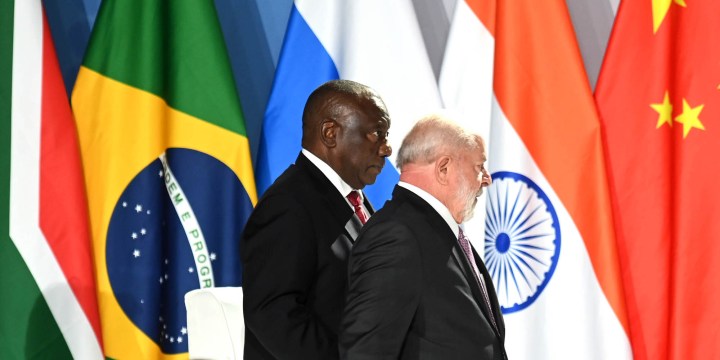BUSINESS REFLECTION
Should BRICS trade in brics? The pros and cons of a common currency

The problem with a common currency is that it requires economic harmonisation, and that requires a common central bank. The BRICS countries are just too diverse for that to happen. And that is even before the group expands.
Brazilian President Luiz Inácio Lula da Silva once again made the pitch for a new BRICS currency in his speech at the opening plenary of the summit in Johannesburg. Da Silva said the creation of a currency for trade and investment transactions between BRICS members “increases our payment options and reduces our vulnerabilities”.
But nobody agrees with him — at least about creating a common currency — and the representatives of other BRICS members try to be as diplomatic as they can about it by saying, “It’s some way off”. If you remove the diplomatic mask, they are saying it’s kinda wacky.
Others have been less diplomatic. The former Goldman Sachs economist who coined the BRIC acronym, Jim O’Neill, has dismissed the idea as “ridiculous”. A common currency, as they are discovering in Europe, is a tricky beast and this is in a region that is geographically contiguous and has strong historical bonds. O’Neill told the Financial Times, “They’re going to create a BRICS central bank? How would you do that? It’s embarrassing almost.”
The problem with a common currency, as O’Neill concluded, is that it requires economic harmonisation, and that requires a common central bank. The BRICS countries are just too diverse for that to happen. And that is even before the group expands.
Read more: Six new countries invited to join BRICS — See our interactive world map
But I don’t think this is what Da Silva means: he is not talking about a currency for domestic circulation within the BRICS countries. He is talking about a “trading and investing” currency. This is a much more realistic target.
What BRICS countries have in their favour for denominating their trade in a currency outside the dollar is that on average, the grouping produces a trade surplus (mostly thanks to China). That means there would generally be no necessity to buy outside currency to conduct trade.
Furthermore, it would then be possible to encourage even outsiders to the BRICS group to denominate their trade in the common currency. By using their trading muscle, which is not insignificant, particularly the economic heavyweights, it is possible to think of countries demanding their exporters and importers denominate their trade in, shall we call it, brics.
Trade effects
But would that facilitate trade, or would it harm trade? As it stands, my guess is that it would harm trade, at least in the short term. There are two things exporters (and importers for that matter), really want to know.
Thing No. 1: Will I get paid?
Thing No. 2: Will I get paid the value of my products that was specified in our agreement? If the contract is denominated in rands, for example, there is a good chance the exporter is gonna get screwed.
Volatility hurts trade because to secure Thing No. 2, importers and exporters have to try to hedge their currency risk — or accept the outcome. The larger the volatility, the more expensive and the more risky that becomes.
At the moment, the dollar is now used in about 84.3% of cross-border trade, compared with just 4.5% for the Chinese yuan. Why are Chinese exporters to, say, Vietnam, denominating their trade in dollars? After all, they have the option of denominating their trade in yuan, a very stable currency. But generally, they don’t.
There are many reasons: liquidity, security, and reusability — the ability of the seller to use the currency for trading in other goods with other countries — are all important issues. Most important of all, most of the countries in the group have exchange controls. Russia used not to have exchange controls — now it does. Exchange controls are extremely trade-unfriendly and tend to be adopted when countries face, or think they may face, a currency crisis.
It strikes me that the dollar has some of the same qualities as Google search: the more people use it, the more useful it becomes; the more useful it becomes, the more people use it, and so on. It has, in the terminology of tech, the network effect. This is partly the reason why it keeps coming up at BRICS meetings. If you want to displace the leading network, you are gonna have to, as my Canadian colleague often says, come loaded for bear. One country on its own, even China, is just not going to cut it.
But it is possible to envisage some trade, at least with each other, being conducted in a constructed common currency. After all, the creation of the euro was designed partly with ideas of utility in mind. Part of the problem with denominating your trade in a foreign currency is that you are effectively taking on risks external to the country of either the buyer or seller. There is some transaction risk involved in using the currency of a third country.
The problem is that this transaction risk could be even greater if you denominate in the currency of the buyer or the seller too — it’s just a different kind of risk. The BRICS grouping chafes at the necessity of using the dollar for trade. Fair enough. But the question remains: Would the alternative be any better? DM



















Perhaps in the interests of the sme objectives we should barter with chickens and offal!